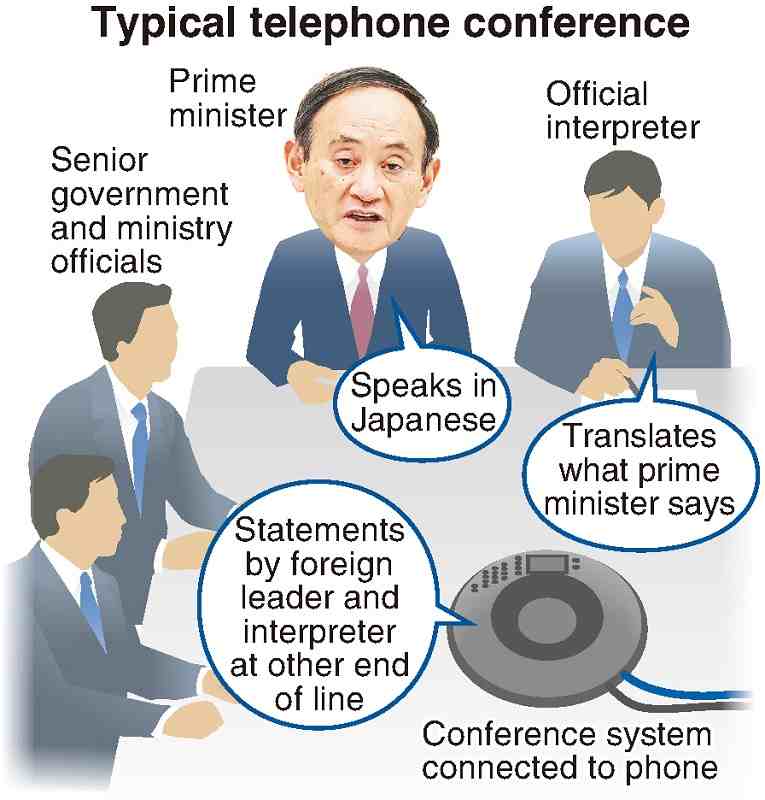
16:35 JST, March 27, 2021
The global coronavirus pandemic has changed the way diplomacy is conducted. With cross-border travel restricted, world leaders are increasingly using telephone conversations for communication, instead of face-to-face meetings.
“Call me Yoshi, and I’ll call you Joe, OK?”
Early on Jan. 28, Prime Minister Yoshihide Suga said these words to U.S. President Joe Biden at the beginning of their first-ever telephone conversation at his workroom in the prime minister’s official residence. During their half-hour conversation, the two leaders reportedly called each other by their first names from time to time and spoke in a friendly mood.
It has been six months since Suga took office. Since visiting Southeast Asian countries in October last year, he has not made any official overseas visits. On the other hand, he has had a total of 34 telephone conferences with leaders of various countries. The number is remarkable, even compared to the activity of former Prime Minister Shinzo Abe, who was good at diplomacy and held 21 telephone conferences in the first six months of his second Cabinet.
Such phone conferences use telephones installed in the Prime Minister’s Office and prime minister’s workroom in the official residence and other places. While they are described as “telephones,” the prime minister does not actually hold a receiver to his ear. Each of the prime minister’s workrooms is equipped with a microphone and a speaker connected to the phone. The prime minister and an interpreter speak to the microphone, which is placed on a table, while voices on the other end of the line come from the speaker. It is also possible to visually teleconference using videophone, depending on arrangements made with the other country.
While Japan is connected via exclusive government lines to countries like the United States and South Korea, a general phone line is used for other countries. To prevent calls from being wiretapped, a measure is taken to encrypt voices on the phone. The contents of the telephone conversations are treated as confidential and are not disclosed to the public.
When the Japanese and U.S. defense ministers held a telephone conversation on Jan. 24, a photograph of Defense Minister Nobuo Kishi holding a receiver was released to the media, but the Defense Ministry said that it was just an image to illustrate media reports and the receiver was not actually connected to the phone.
Interpreters play an important role
Statements of top government officials are translated by the country’s official interpreter, in principle. Usually, the prime minister and other parties speak in their own native language first and then the interpreter translates what they said into the language of the person at the other end of the line.
Given that a single word could determine the outcome of negotiations, if an interpreter of one country has mistranslated or omitted words, the interpreter of the other country should correct them, which is also an important role.
Interpreters are mainly young Foreign Ministry officials. The ministry currently has experts in about 40 languages, and interpreters are selected for about 30 languages. For English, the most frequently used language, there are about 10 interpreters, while there are one or two interpreters for less frequently used languages. In recent years, many non-English-speaking countries have designated English as the language for telephone conversations, so it is possible to handle almost all telephone conferences with the current staff.
Prime ministers and Cabinet members who are fluent in foreign languages sometimes speak directly with their counterparts without using interpreters. However, when they deal with topics requiring highly professional knowledge, such topics are usually discussed via interpreters so as to prevent mistakes. While administrative and regulatory reform minister Taro Kono is reputed to be fluent in English, he said in his blog when he was foreign minister, “I use English when having a casual chat with U.S. Trade Representative Robert Lighthizer, but I use Japanese when we have our official talks.”
Congratulations via Twitter
Telephone conversations are often used to extend greetings to newly inaugurated leaders or make contact in case of emergency, among other purposes. While there is little time difference with nearby countries like China and South Korea, time differences with the United States and European countries are so big that day and night are reversed. For that reason, arranging telephone conversation dates as part of busy schedules is a challenge.
Lately, there are many cases in which world leaders make posts on Twitter ahead of telephone conversations. When Biden was inaugurated on Jan. 20, many world leaders took to Twitter to congratulate him, and Suga also sent a tweet at 2 a.m. on Jan. 21, Japan time.
Even as world leaders communicate with each other in a variety of ways, senior Foreign Ministry officials say that relationships of trust between countries are based on human interaction, which makes face-to-face talks the ne plus ultra of diplomatic communication.
With an eye on the resumption of face-to-face diplomacy after the coronavirus pandemic is over, world leaders are trying to build relations using telephones and social media for now.
Top Articles in Politics
-

Japan PM Takaichi’s Cabinet Resigns en Masse
-

Sanae Takaichi Elected Prime Minister of Japan; Keeps All Cabinet Appointees from Previous Term
-

Japan’s Govt to Submit Road Map for Growth Strategy in March, PM Takaichi to Announce in Upcoming Policy Speech
-

LDP Wins Historic Landslide Victory
-

LDP Wins Landslide Victory, Secures Single-party Majority; Ruling Coalition with JIP Poised to Secure Over 300 seats (UPDATE 1)
JN ACCESS RANKING
-

Japan PM Takaichi’s Cabinet Resigns en Masse
-

Japan Institute to Use Domestic Commercial Optical Lattice Clock to Set Japan Standard Time
-

Israeli Ambassador to Japan Speaks about Japan’s Role in the Reconstruction of Gaza
-

Man Infected with Measles Reportedly Dined at Restaurant in Tokyo Station
-

Videos Plagiarized, Reposted with False Subtitles Claiming ‘Ryukyu Belongs to China’; Anti-China False Information Also Posted in Japan
























